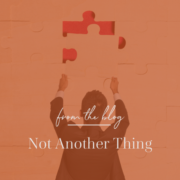Rethinking Getting Things Done (4 Tools To Make Better Choices With Your Time)

Listen to the full podcast episode to learn how to stop being motivated solely to getting things done and 4 game-changing techniques to make better choices with your time.
Time management. It’s something we are all too familiar with. I’m sure that if you are reading this right now, you have at some point wondered and tried to figure out “How do I get it all done?”
Here’s a truth for you: the quest to get it all done is not only a high-pressure one, it’s impossible.
Instead, I want to show you how to shift the focus of that quest from a draining one destined for unhappiness to a more fulfilling one that allows you to make better choices with your time and shows you that you are enough no matter how much you get done.
This last month I went on a summer adventure with my son to Slovenia. If you’re like me, perhaps you haven’t heard of Slovenia (until I agreed to this trip). It’s a European country located between Croatia and Turkey. We arrived in the morning a bit jet-lagged and realized we couldn’t get into our hotel room for another 4 or 5 hours.
Conveniently enough, there was an old mini-golf place right outside the back of the hotel. Game on!
I walked up to the man working the counter and said “Hi, can we get two rounds of golf?”
He looked up with an unenthused expression at best and slowly said – in an annoyed tone – “First, it’s ‘Hello.’ Now, yes. You can buy two rounds.”
I walked away confused. Had I just been schooled by the mini-golf man? A friend with us assured me that I had not imagined it. I’d thought I’d said hi and she affirmed that I did. So, needless to say, I was taken by surprise and slightly irritated. I was the client after all, right?
All week, I just could not get my first introduction to a Slovenian man out of my mind. I later asked my husband – who travels more than I do – what had happened and he believed the Slovenian man was most likely irritated because I was being like most Americans: moving too fast.
I replayed the incident back in my mind revisiting what I could have done to take things a bit slower. Throughout the rest of our trip, I remained aware of my pace in comparison to other Europeans. Not only did I not want to annoy more of them, but I was also genuinely curious.
One day, my friend pointed out that we were the only people among the Europeans walking so fast to get somewhere. And she was right. We were basically power walking whereas no one else was. What was I doing? It was a vacation after all. Where others lingered next to the lake sunbathing, eating, or simply being, we were steadily progressing through activity after activity.
I realized how crazy we Americans must appear to them.
What is underneath this fast pace of ours?
As I do with most things that don’t feel right, I started looking deeper into it. Here’s what I uncovered…
This fast pace that we’re accustomed to is the byproduct of the pursuit of getting things done. Its primary intent is to maximize productivity and cross things off the list, even in some cases when there is nothing to get done — as when you are waiting for a hotel room in a foreign country at the start of your vacation.
This really got me thinking. How long have I worked and strived to master my time? How obsessed or passionate have I gotten with crossing things off my to-do list?
After more than half a century of trying and never getting it done, I realized that getting it all done is never going to happen. I won’t ever reach the level of control in my life that I’ve been aspiring to reach for years. But contrary to what you may believe, this realization did not make me more anxious. It did the exact opposite. I felt calm and free. This battle with time no longer existed.
The challenging question was no longer “How am I going to get it all done?” It was now “What do I want to do and what do I want to drop?”
The key to freeing yourself from this struggle and any of its associated anxiety is to accept this truth rather than resist it. We have to surrender to the reality that we can’t do it all and honestly, we aren’t meant to do it all.
Our challenge isn’t about managing getting everything done or getting everything done that others want from us —-that’s never going to happen —- but to decide what not to do and feel at peace about not doing it. That is what we need to become better at.
If you want to reconfigure your life around what matters, you have to have this mental mind shift first. Once you accept that and get comfortable with the freedom that it provides, I have 4 concrete practical techniques for a life of more meaning and less struggle:
Do what is most important to you first.
Schedule a meeting for the first hour of your day with yourself for your most important work. My clients refer to this as their (MIW) and protect it as you would an appointment with your most respected client. Leaving your most important work to the end of the day is never a good idea or the right approach.
Focus on what you have done rather than what you haven’t.
This technique has been particularly helpful for my clients. It is so easy for us to forget what we have successfully accomplished. Instead of ending your day in a place of lack, I encourage clients to create a list of all they have done. While you may enjoy crossing things off your to-do list, this technique prompts you to move those same items to your “Done” list to celebrate and move your attention to abundance and success versus only placing your attention on what is missing or their failure to do yet.
Decide to do only 1-3 projects at a time.
Too often we have 7-10 projects going at once and we never complete any which contributes to the struggle and anxiety. Instead, choose 1 to 3 projects to focus your time on and postpone all the rest until you complete those projects first.
Create a “drop list.”
This is the list of those things that you will temporarily or forever drop. If you find that every year or every month you are writing down the same thing on your list, be willing to release it and drop it.
When we drop the illusion that we might get to a place where we feel in control of our life – an actual impossibility – we let go of the fast pace and crazy struggle which leads to more self-judgment and shame when we fail.
With this understanding, it became suddenly clear why anxiety hit new high levels during the pandemic. In an uncertain world that felt out of control, many of us worked even harder to control it. Then people felt defeated and hopeless which created more anxiety. The struggle was endless and I believe it has led to a high rate of anxiety and burnout.
My dear wise aunt recently gifted me the book Four Thousand Weeks: Time Management for Mortals which completely proved the theory that when the student is ready the teacher appears.
In it, the author Oliver Burkeman states:
“What matters is learning to make decisions consciously rather than by default or deceiving yourself that with enough hard work you can get it all done.”
Now, I have only read parts of this book so far, but if you feel like you are in a constant race, like there is never enough time, or you’re wondering if the work-life balance is real (which it is not) then I encourage you to check out Four Thousand Weeks: Time Management for Mortals by Oliver Burkeman.
Before we wrap things up, I want you to know that later during the week of vacation with my son, we went back to play mini-golf and the same man was there again. I approached him and quite calmly said, “Hello.” I then paused, giving him time to respond. “Hello,” he said in return. Once our greetings were completed calmly on both ends, I asked for two rounds of golf. He handed me two golf clubs and a ball and my son and I played. I was civil, present, and calm. Very different from my unconscious habit of being efficient in a culture that promotes efficiency and productivity I am used to. It felt good. It felt better. It was a perspective change and I had a choice on how I would show up.
This week I encourage you to choose one of the four techniques I discussed and remember: we don’t have time to get it all done, but we have the time to get done what is important if only we choose it.
In this episode I share:
- The life-changing lesson I was reminded of on a summer adventure with my son
- The real reason why we’re constantly in a hurry and struggling to get it all done
- 4 transformational techniques to help you get more of what matters done and reevaluate how you equate your worth with your productivity
- What I believe has led to the uptick in anxiety and burnout throughout our experience in the pandemic
- How to give yourself more credit and actually celebrate your wins
Resources and related episodes:
- Tune into the previous episode, Resolving Conflict Like a Pro
- Episode 100. Leading From a Heart at Peace
- Grab a copy of Four Thousand Weeks: Time Management for Mortals by Oliver Burkeman
- If you’d like to be notified of when new podcast episodes are released, you can do so here: Playing Full Out
- Learn more about the Inside Out Method
- Connect with Rita on LinkedIn.
Subscribe on Apple Podcasts for more tips, tools, and inspiration to leading the optimal vision of your life, love, and leadership. Remember, a half version of you is not enough. The world needs the fullest version of you at play.
___
About Rita Hyland
With over 20 years of experience as an executive and leadership coach, Rita helps leaders — emerging and established — excel in corporate and entrepreneurial environments.
Rita believes if leaders were more clear about how transformation really works and more intentional about creating what they want, their impact, success, and influence in the world would be unstoppable.
Through her coaching programs, private coaching, and masterminds, Rita shows leaders how to win consistently and create the impact and legacy they desire.
Central to Rita’s work is the understanding that you will never outperform your current programming, no matter how strong your willpower.
When you learn to use Rita’s proprietary Neuroleadership Growth Code, a technology which uses the best of neuroscience and transformational psychology to hit the brain’s buttons for change, YOU become both the solution and the strategy.
Her mission is to end talented, hard-working, and self-aware leaders spending another day stuck in self-doubt or confusion and not contributing their brilliant work and talent the world so desperately needs.









Rita, I just love this episode! I especially like your insight on how we habitually start each day with an “accomplishment deficit” that we feel the need to dig our way out of. How exhausting!
After listening to this I was at a PT session with a hot pack on my shoulder, and instead of letting my mind race through a list of unfinished tasks, I was able to just sit and enjoy the comfort. I swear, that 10 minutes was the highlight of my week! Thanks for hitting my ‘reset button!’